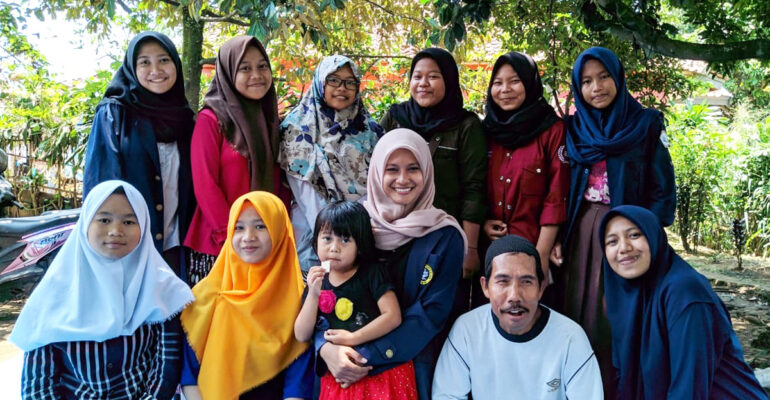Young Cassavapreneurs Indonesia, Creative Entrepreneurship Program Ideas for IPB University Students

IPB University students who are members of the Student Creativity Program in Community Service (PKM-M) carry out the Indonesian Young Cassavapreneurs (YCPI) program. The team consisted of PKM-M chairman Sultan Laga Putra Azdi, whose members were Zakiyah Salsabil Syahfil, Maulida Nurul Fatkhiyatut Taufiqoh, Flamora Gresafira Cahya and Sri Wiji Utami. The basic idea of ??the five students with the built village program located in Benteng Village, Ciampea Sub-district, Bogor district, the team wanted to contribute in achieving the first goal of the Sustainable Development Goals (SDGs) of 2030, namely ending poverty anywhere in all forms.
The Chairman of PKM-M, Sultan Laga Putra Azdi said, the Young Cassavapreneurs Program (YCPI) aims to hone entrepreneurship skills, especially for young people in Benteng Village by processing cassava into processed products that have a higher selling value. Young entrepreneurs are proven to be able to grow a more competitive economy and enable the creation of shared prosperity while adapting to an increasingly globalized society faster.
This is in line with the idea of ??his team to foster an entrepreneurial spirit at an early age by exploring the potential of the village and local food.
“In order for the YCPI program to run smoothly and sustainably, the team collaborated with the Nusa Educator Community in Benteng Village. This community was present in response to the anxiety of several young people and one of the village leaders with the condition of education in Benteng Village being still low. Community Educator Nusa opens an Open School for children who want to continue their education to the level of Junior High School (SMP). At present there are several students who are members of it. They are the children of Benteng Village who have economic limitations. These children were the targets of PKM-M Young Cassavapreneur Indonesia (YCPI) activities, “said the Sultan.
Sultan added, Benteng Village is one of the villages whose territory is located in Ciampea District, Bogor Regency with an area of ??248.85 hectares. Benteng has an agricultural area of ??33.5 hectares with cassava as its main commodity. When the harvest season arrives, the selling price of cassava can fall to 50 percent, which is Rp 700 per kilogram from the normal price of Rp. 1500 – Rp. 2000. The fall in the price of cassava at the time of harvest can harm all farmers. “Knowing these facts, we see opportunities to improve community welfare and prepare Benteng village youth to become future successful entrepreneurs in the field of cassava,” he explained.
Sultan explained, entrepreneurship training programs carried out with lecture and role play methods began planting entrepreneurial motivation, raw material procurement, product processing, packaging and selling price analysis, and product marketing. The products produced are various pastries (nastar, cheese sago, peanut cake), flower shake, eggroll made from cassava or mocaf flour. “In addition to increasing the entrepreneurial spirit from an early age, we also help cassava farmers and the government strive to increase the selling value of cassava with an entrepreneurial program of mocaf flour from cassava raw materials,” Sultan said.
The team hopes that this program can help increase motivation, entrepreneurship skills from the target, and help optimize village potential and expand the program to other villages according to their potential. The YCPI team also produced a guidebook entitled “Prosperous with Cassavapreneurs”. This book is intended for readers who are interested in implementing the YCPI program in other regions or adapting it to increase the added value of other commodities. The YCPI team hopes that the birth of young entrepreneurs from various villages can support the realization of the One Village One Company government program. (Awl / ris)



